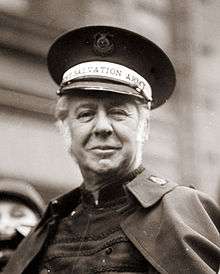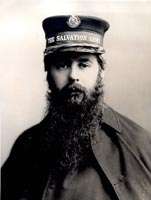Bramwell Booth
| Bramwell Booth CH | |
|---|---|
 | |
| 2nd General of The Salvation Army | |
|
In office August 1912 – February 1929 | |
| Preceded by | William Booth |
| Succeeded by | Edward Higgins |
| 1st Chief of the Staff of The Salvation Army | |
|
In office 1881–1912 | |
| Preceded by | Office Established |
| Succeeded by | T. Henry Howard |
| Personal details | |
| Born |
8 March 1856 Halifax, West Riding of Yorkshire |
| Died |
16 June 1929 (aged 73) Hertfordshire |
| Resting place | Abney Park Cemetery, Stoke Newington, London |
| Spouse(s) | Florence Eleanor Soper (m. 1882–1929) |
| Parents |
William Booth Catherine Mumford |
William Bramwell Booth, CH (8 March 1856 – 16 June 1929) was the first Chief of Staff (1881–1912) and the second General of The Salvation Army (1912–1929), succeeding his father, William Booth.
Biography
Born in Halifax, Yorkshire, England, the oldest child born to William Booth and Catherine Mumford, he had two brothers and five sisters, including Evangeline Booth, Catherine Booth-Clibborn, Emma Booth and Ballington Booth. The Booth family regularly moved from place to place as William Booth's ministry necessitated until the family finally settled in London in 1865. Bramwell Booth was involved in The Salvation Army right from its origins as the obscure Christian Mission, established in Whitechapel in 1865, into an international organisation with numerous and varied social activities. He was educated at home, briefly at a preparatory school and at the City of London School, where he was bullied.[1]
Known to his family as 'Willie', as a youth he suffered poor health and had a slight hearing loss. In 1870, aged just 14, Bramwell Booth started to help in the management of his father's Christian Mission and in the cheap food kitchens set up in its early days. He had intended to study medicine and had a fear of public speaking, but despite these obstacles he became William Booth's amanuensis, adviser and administrator. He became an active full-time collaborator with his father in 1874, and an officer when the Christian Mission became The Salvation Army in 1878.[1]
The name The Salvation Army developed from an incident in May 1878. William Booth was dictating a letter to his secretary George Scott Railton and said, "We are a volunteer army." Bramwell Booth heard his father and said, "Volunteer? I'm no volunteer, I'm a regular!" Railton was instructed to cross out the word "volunteer" and substitute the word "salvation".[2]
Chief of the staff

| Part of a series on |
The Salvation Army
 |
|---|
| Background |
|
Christianity · Protestantism Pietism · Arminianism Methodism · Holiness Movement Evangelicalism |
| Organization |
|
General Chief of the Staff High Council Commissioners Officer · Soldier · Corps |
| Prominent Salvationists |
|
William Booth Catherine Booth Bramwell Booth Florence Booth Evangeline Booth Ballington Booth Catherine Bramwell-Booth Frederick Booth-Tucker Arthur Booth-Clibborn Elijah Cadman John Lawley George Scott Railton T. Henry Howard Charles Jeffries Theodore Kitching Darkie Hutton William Ridsdel Ray Steadman-Allen Eva Burrows |
| Other topics |
|
Brass Bands Promoted to Glory Order of the Founder Limelight Department Christmas Kettle The War Cry Articles of War Reliance Bank |
| Related organisations |
|
American Rescue Workers Volunteers of America Skeleton Army The Blind Beggar |
|
Christianity portal |
In 1881, General William Booth appointed Bramwell as his Chief of the Staff of The Salvation Army. Bramwell would hold this title until his father's death, when he himself was named General in his father's will.[3] In 1885 Bramwell was involved with William Thomas Stead in an attempt to publicise the prostitution of young girls. The lurid revelations of how thirteen-year-old Eliza Armstrong was sold for £5 resulted in the 1885 Criminal Law Amendment Act, which raised the age of consent to sixteen years. After the revelations, Booth, Stead, and Rebecca Jarrett, a converted brothel-keeper who assisted them, were arrested on several charges. Booth was acquitted but the others served short prison terms.[1]
On 12 October 1882 Bramwell married Captain Florence Eleanor Soper, the eldest daughter of Dr Soper, a medical practitioner of Blaina, Monmouthshire. The congregation at Clapton Congress Hall were charged one shilling each for admission to the ceremony. She had joined The Salvation Army in 1880 and worked in France with Bramwell's sister Catherine Booth. After her marriage she took charge of the women's social work. All of their seven children (five daughters and two sons) became active workers in the army. Their eldest child was Commissioner Catherine Bramwell-Booth.[1]
General of The Salvation Army
Upon his death in 1912, William Booth appointed Bramwell his successor as General, by way of a sealed envelope. This process was the legal way in which a successor to the General was chosen, as outlined by the Christian Mission's founding deed of 1878.[3] Like his father, Bramwell Booth ruled autocratically, and expected complete obedience. However, what officers had tolerated from William Booth, by then known as 'The Founder', they would not tolerate from Bramwell.
The early years of Bramwell Booth's Generalship were complicated by World War I, which threatened the international nature of The Salvation Army, with Salvationists in both Germany and Great Britain. However, he was able to steer a course that offended neither the Germans nor outraged British public opinion, saying in his Christmas message of 1915, "Every land is my fatherland, for all lands are my Father's.".[4]
Like his father before him, Bramwell would not tolerate any perceived insubordination and he summarily retired Salvation Army officers with little reason or sent officers too young to be retired to distant appointments; such officers were said to be in 'the freezer'.[3] Bramwell faced allegations of nepotism, in that he appointed his own children to posts for which others were better qualified. This system could be seen as being inherited from his father, who similarly appointed his own children to high ranking positions. This led to accusations that The Salvation Army was a Booth family-business;[5] however, William Booth had once said to his children that "The Salvation Army does not belong to you, or to me, it belongs to the world" and was very wary of the leadership of the Army becoming a dynasty.[3]
Discontent simmered among Salvation Army senior officers, including the chief-of-the-staff Edward Higgins and George Carpenter, who incidentally had been sent to 'the freezer' by his appointment to Sydney in a role he previously held 22 years earlier. These two officers later became Generals of The Salvation Army. Another notable Army leader that disagreed with Bramwell's leadership was Commissioner Charles Jeffries who would later be British Commissioner.[3] In his final years as General he increasingly gave control of The Salvation Army to his wife, Florence Booth, who was given power of attorney when he was away travelling. She had been the Army's 'First Lady' since the death of his mother Catherine Booth in 1890, and had started several Army organisations including the Home League, Girl Guards, and League of Mercy.[1]
As the years passed the Army's senior officers, including Bramwell's sister Evangeline Booth and his former brother-in-law Frederick Booth-Tucker, began to question his leadership. In May 1928 Bramwell's health began to deteriorate, and by September he was suffering from insomnia and depression. His poor health offered those in the Army who were dissatisfied with his leadership an opportunity to act, and on 8 January 1929 the first High Council of The Salvation Army convened, and firstly asked the General to resign due to his ill health, which, they said, was hampering him in the performance of his duties and decisions. He refused to resign, believing that his health would soon be fully recovered, so on 13 February 1929 the High Council voted by 52 votes to 5 that Bramwell's term of office as General should now end, based on Bramwell being 'unfit' to hold the position.[3] Booth was succeeded in the election of Edward Higgins, his Chief of the Staff.[6]
General Bramwell Booth then took the High Council to court, which lost him a lot of respect; he also lost the court case. His sister, Evangeline Booth later succeeded General Higgins to serve as the fourth General of The Salvation Army.[1] Henceforth the General of The Salvation Army would be elected by the High Council.[4]
On 29 April 1929 the now former General Bramwell Booth received a letter from Prime Minister Stanley Baldwin stating that King George V had appointed him a member of the Order of the Companions of Honour.[4]
Death
On 16 June 1929 his family was summoned to his bedside, and on that Sunday evening General Bramwell Booth died at his home, The Homestead, Hadley Wood, near Barnet, Hertfordshire. For the Friday and Saturday following his death Bramwell Booth's body lay in state at The Salvation Army's Congress Hall. On the Saturday evening 10,000 Salvationists and friends filled the Royal Albert Hall to bid farewell to their beloved former General.[4]
General Bramwell Booth was buried opposite his parents at Abney Park Cemetery, Stoke Newington, London. The grave lies near the southern entrance. Huge crowds attended his funeral. He was commemorated by the Bramwell Booth Memorial Hall, Queen Victoria Street, London.
Notes
- 1 2 3 4 5 6 "Booth, (William) Bramwell (1856–1929)". Oxford Dictionary of National Biography. Oxford University Press. Retrieved 24 August 2010.
- ↑ "William Bramwell Booth 1829–1912 His Life and Ministry – A Very Short Biography". Retrieved 30 May 2010.
- 1 2 3 4 5 6 Larrson, John (2009). "1929: A Crisis that Shaped The Salvation Army's Future". London, United Kingdom: Salvation Books. p. 376. ISBN 978-0-85412-794-8. Archived from the original on 12 January 2011.
- 1 2 3 4 "General Bramwell Booth". Sacollectables.com. Archived from the original on 27 November 2010. Retrieved 24 August 2010.
Born in 1856, the eldest son of the Founder, William Bramwell Booth was appointed Chief of the Staff by his father in 1880. ... On October 12th 1882 Bramwell married Captain Florence Soper at Clapton Congress Hall. ...
- ↑ Hodges, Samuel Horatio General Booth: “the Family,” and the Salvation Army: Showing its Rise, Progress, and ... Decline (1890)
- ↑ "Bramwell Booth". Salvation Army. Retrieved 24 August 2010.
He married (12 Oct 1882) Florence Soper [b: 12 Sept 1861 d: 10 Jun 1957], a dedicated officer who had worked with his sister Kate in Paris, in 1882. Their seven children were raised in much the same fashion as he had been reared: educated at home and with the Army constantly kept in mind. His two sons, (Bramwell) Bernard and (William) Wycliffe, and five daughters: Catherine Bramwell-Booth, (Florence) Miriam, Mary B, Dora, and Olive E, remained staunch warriors.
External links
| Wikimedia Commons has media related to Bramwell Booth. |
- Works by Bramwell Booth at Project Gutenberg
- Works by or about Bramwell Booth at Internet Archive
- Bramwell Booth at Find a Grave
- Lying in State of General Booth British Pathé news 1929
- Booth's funeral procession British Pathé news 1929
| Preceded by William Booth |
General of The Salvation Army 1912–1929 |
Succeeded by Edward Higgins |